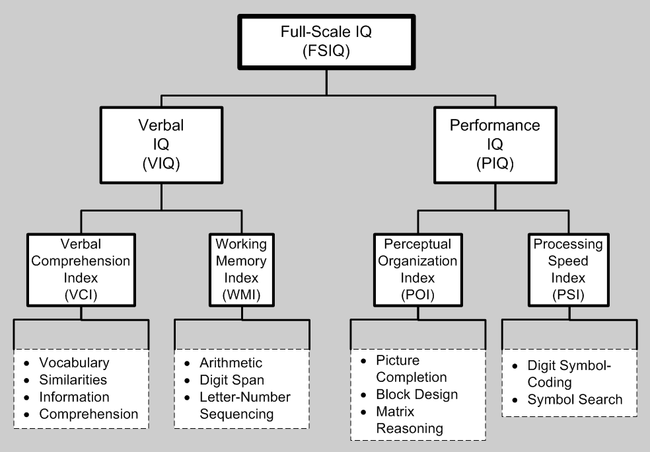Online on a handful of occasions I have heard people say they ave really high IQs (>140), but that they are ‘near retarded’ or impaired at one or more of the sub-intelligences, such as spacial intelligence. In a video, Dr. Peterson says he has an IQ in excess of 150 and a 99%+ verbal score, yet mediocre quantitative intelligence.
However, is it possible to be impaired at once type of intelligence as measured by an IQ test and still have an IQ above 140? Most adult IQ tests max out at around 140, so to get such a high score implies getting all the questions correct. Hence no weak areas. One of the most widely administered adult IQ tests is the The Wechsler Intelligence Scales. It is divided into multiple sub-tests:

Based on the reading I have done, the Wechsler adult test does not seem to differentiate scores above 130 or so, meaning if you you score that high, you are considered ‘very superior’ and no further testing is necessary. Depending on the age of the test-taker, for children, I have heard that scores as high as 155 are possible, but it would seem like most adult IQ tests max out at around 140, which is about 1/200 rarity IQ based on a normal distribution. Due to the limitations imposed by the test format, adult IQ tests are incapable of discriminating IQs above three sigma or standard deviations (around 145). Converting a raw WAIS-IV score into an IQ score is kinda complicated. The raw scores on the 11-12 individual sub-tests are converted into 11-12 scaled scores (1-19) based on a proprietary formula, and this is then used to get the full IQ. Each scaled score has a mean of ’10’ and a standard deviation of ‘3’, so the highest is around 19.
However, doing poorly on one of the sub-tests will hurt your overall IQ. If your Perceptual Organization Index (POI) IQ is -1 SD, and that section is divided into three sub-tests, and you get a score of ‘7’ on each one (corresponding to -1 sigma), then your raw score is already dinged by 36 points from the possible maximum. There is absolutely no way you are going to get a genius score from that.
But is it possible to be a genius anyway. They depends, I suppose, on the type of test and how one interprets the scores as being representative of overall IQ. It’s possible to get a near-perfect score on an IQ proxy such as the SAT, which does not test for the same items as the Wechsler. The SAT only tests math and verbal. Is excelling at those areas but being poor at processing IQ or spatial IQ, the same as having a high IQ overall.
Another issue is that all IQ tests have ceilings. Each sub-test of the Wechsler has a ceiling determined by the number of question on each test. The ceiling for each sub-test of the Wechsler maxes out at 3 standard deviations (for a maximum score of 19 points, as described above) , but what if someone effectively has +7 standard deviation or higher ability? Truncating scores at 3 standard deviations possibly underestimates possible IQ. But not truncating the scores can also create problems, because the question arises if someone who really, really excels on a sub-test but does mediocre on the other parts, is as smart as someone with an equal but balanced score. A computer, for example, could have superior digital recall ability or be programmed to know the definition of every word of the English language, but no one would consider it to be a genius in the same way that a person is.
Finally, can IQ be boosted. And the answer is “no.” As Dr. Peterson has mentioned, the depressing reality is it cannot. Efforts to boost IQ through ‘brain training’ only improves performance on the specific type of puzzle and does not generalize to an IQ test. Same for mnemonic devices, which are supposed to improve short-term memory, such as forward and backwards digit span. As discussed in Bullshitting With Einstein, despite all the hype over mnemonics, maybe only 2 or 3 studies have ever been conducted on the efficacy of mnemonic devices, and such studies do not control for the most important and obvious variable of all, IQ. Some people get mad when you tell them mnemonics don’t work or are unproven, because they insist it worked for them. But ask their IQ, and it’s usually in the 130-140 range, so is it the mnemonic or IQ that gets credit?